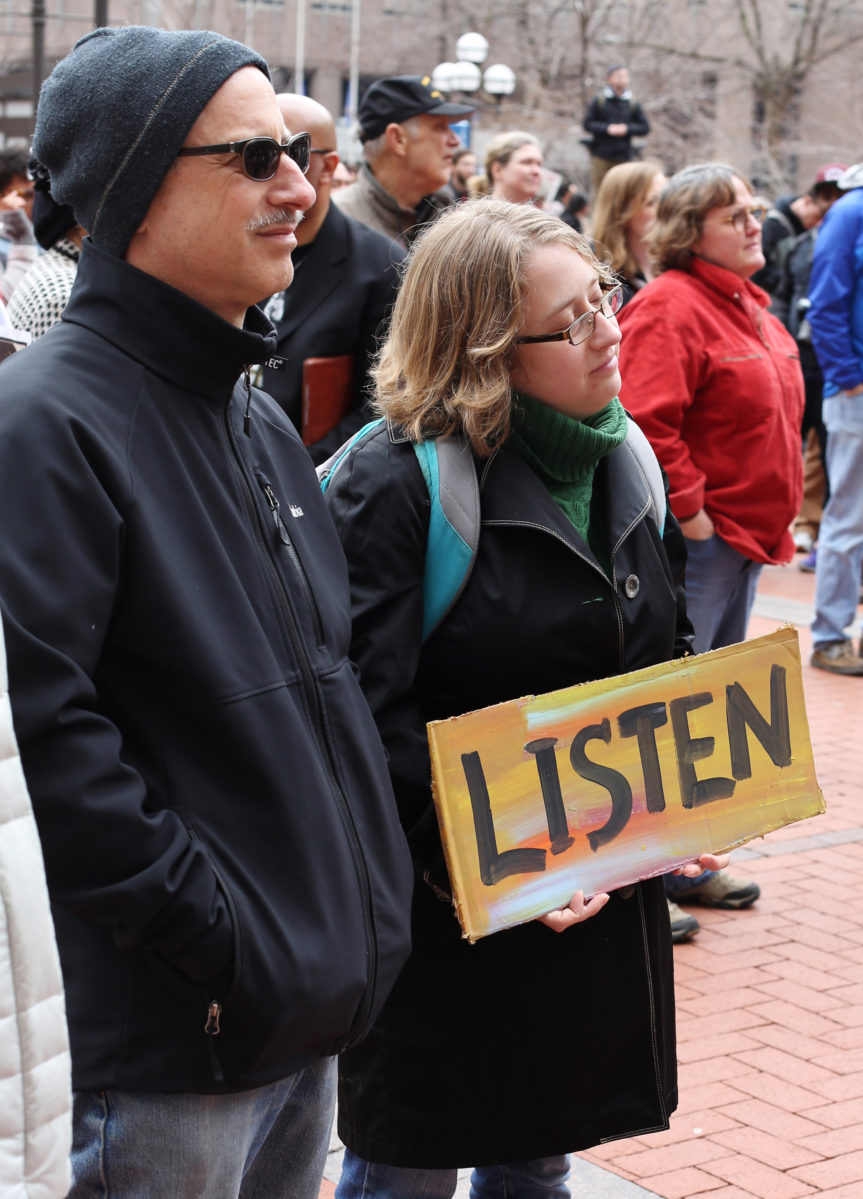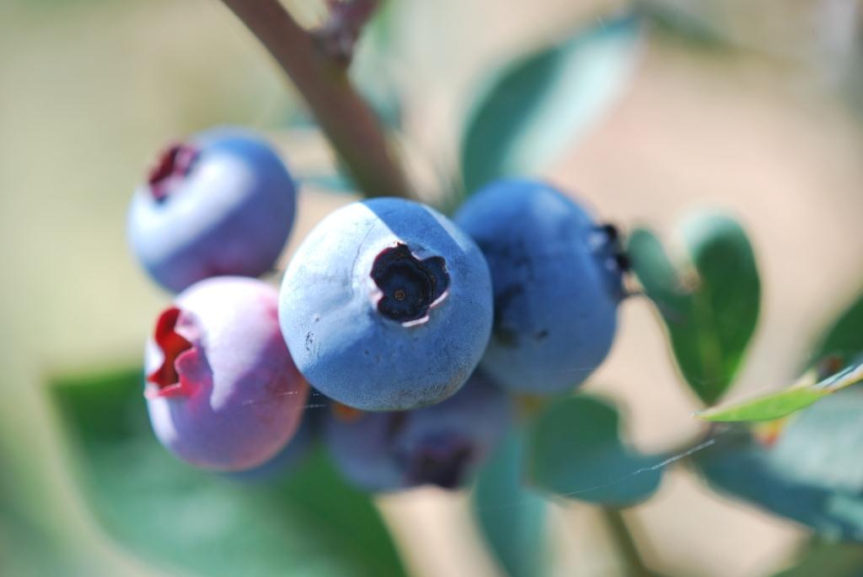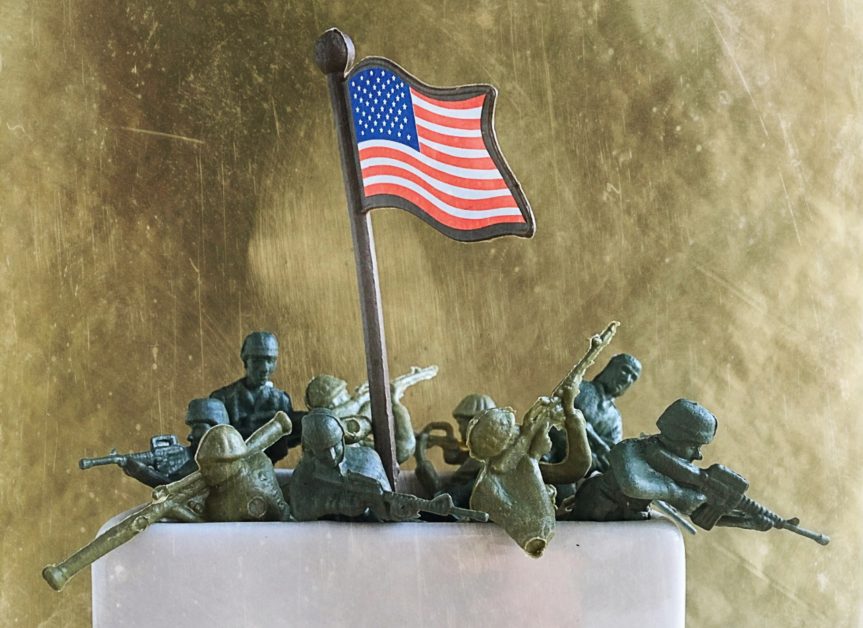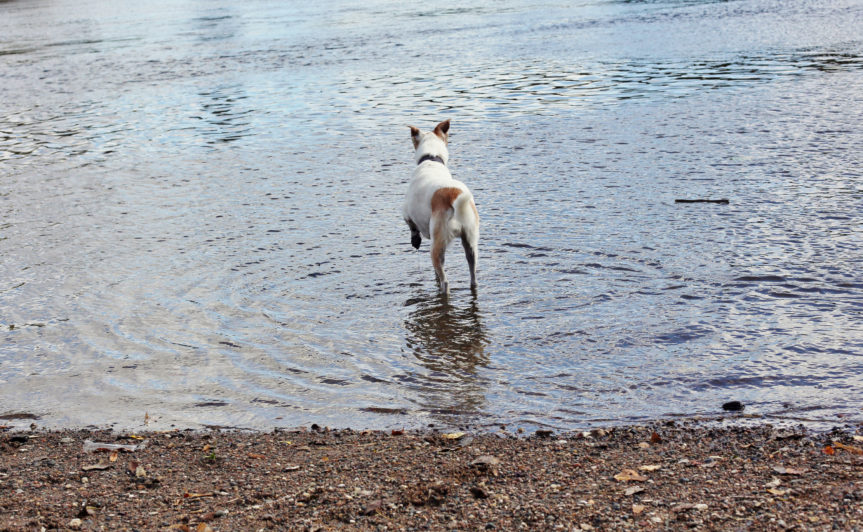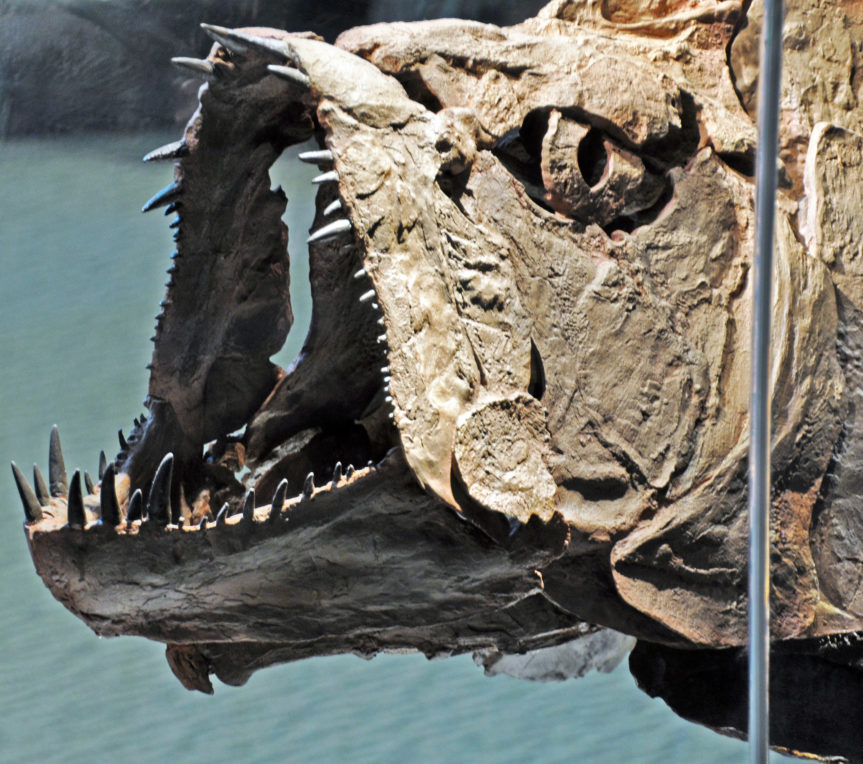Photo by Gina Easley
By Antonia Malchik
About two years ago, my sister and her family reached the edge of a financial cliff, one far too familiar to far too many Americans. My husband and I talked about the choices they had, the importance of being there for family during hard times, and our deep desire for privacy. And then we invited them to move in with us because in an America where the average person’s wages have stagnated for forty years and counting, what choices do any of us have?
Before we started sharing a house, I’d spent years working towards a zero-waste home. Paper towels were replaced with cut-up cloths from worn-out bath and tea towels. All food scraps were composted—even chicken bones after they’d been stripped of meat and drained of protein in a stock pot. Every plastic grocery bag at supermarkets and pharmacies and farm stands was politely refused. I bought raw milk straight from the farm in half-gallon Mason jars once a week and packed my kids’ snacks and lunches in cloth snack bags or little stainless steel containers.
I bought a lot of cloth snack bags and stainless steel containers and reusable grocery bags, all of which arrived in oversized cardboard boxes padded with puffed-up plastic bubbles. I used untold gallons of oil driving to farm stands and milk producers and butchers and flour mills to avoid buying food wrapped in plastic packaging. So much oil to save a certain amount of plastic, but to me it felt important, a contribution to shifting society away from dependence on disposables.
My niece was three when we started living together. She had an individually-wrapped organic fruit leather almost every night after dinner. She’d run over to the snack cupboard, where we kept the shared organic crackers and the big batch of granola I made for the household every week, and bring the package back to my sister or her husband. They ripped it open from the tiny slit at the top, placed there for the smooth convenience expected in a consumer culture where every scant resource of the planet is bent to the will of our ease, or our pleasure.
The fruit leathers are delicious. Sometimes I’d let my daughter have one. Not often because foods like fruit leather and raisins are nearly as bad for children’s teeth as candy, I’ve been told by pediatric dentists. They snuggle into the grooves of molars and the sticky residue is hard to brush out.
Sometimes I ate one, too. After a childhood of daily Pepsis and powdered milk and an almost complete absence of dental care, my teeth are shot anyway. I have more fillings than teeth, and three poorly-shaped crowns. I’ve lost track of my root canals.
The fruit leather’s wrapper went in the trash. There was always a lot of plastic in there. Soft, pliable wrappings and baggies. Crinkly plastic bags. Diapers and overnight pull-ups. The firm-flexible lids of yogurt containers.
The trash was full of food, too. It pained me to throw carrot ends and coffee grounds and the strings from beans into the garbage, but that started before my sister’s family moved in, when we’d relocated to a neighborhood where compost bins attracted deer and neighborhood dogs, as well as bears and mountain lions.
The fruit leather wrappers and food and thin plastic grocery bags headed to the landfill every Tuesday. They were dumped and buried with all our other trash, closed in the womb of land that surrounds and nurtures us. From there, they compressed on top of the aquifer that a local farmer had recently gotten the rights to tap for the water bottling plant he wants to build. Siphoning water from hundreds of feet under clay and sand and rock to pipe into molded plastic bottles that will be shipped to the hands of consumers reaching out for a convenient guzzle of cool mountain water. A picture of our valley, with its snow-capped peaks, will probably grace the bottle. And maybe the water will contain microscopic particles from the fruit leather wrappers that departed our house in plastic bags, nestled next to the chicken carcasses and diapers.
The living situation was difficult. We were squeezed together in a small house where my two school-aged kids and my sister’s preschooler bounced around on their blow-up Rody donkeys and played dress-up and shared a wide variety of cold viruses and stomach bugs. We adults managed meals and tried unsuccessfully to give one another the privacy we all craved. We thought constantly about the day when we could live in our home spaces as we wished without having to adapt to one another.
We all tried so hard, tried to get along, tried to meet one another’s needs, tried to step quietly around the house when others were sleeping and one of us needed to go to work early. It’s a testament to how much we care about one another that we were able to do this with minimal (though not nonexistent) friction. But every day I looked at the fruit leather wrappers and plastic grocery bags and thought about endocrine disruptors and the floating Pacific garbage patch and the damaged health of humans and ecological zones near the chemical plants that make these objects and wondered: what is the point of learning to live well together if we change our ecosystem beyond our species’ ability to adapt? And yet, what was the point of all my plastic-saving angst if we can’t learn to live well together?
•••
In August 1941, as Hitler’s Army Group North blew up roads and train lines in ever-closer encroachment on Leningrad in the Soviet Union, my father’s mother and her two older children, my aunt and uncle, took the last train out of the city. They spent a month living on kasha—hot buckwheat cereal—in the train car with other families, winding through the country to avoid bombed rail lines before landing in the Ural Mountains. Government mandates assigned the war refugees to local residents’ homes, and the family my relatives were housed with hated them. They hated sharing their space, hated having Leningraders in their home, hated being forced to split their resources with refugees.
Once there, my grandmother, a metallurgical engineer, worked as a manager at the metallurgical factory, and nights she worked on the factory line. When she was home she chopped wood to keep her children, and the other family, warm, since the grown sons who lived in the house refused to do so on principle. She grew potatoes to feed her kids and gathered mushrooms in the woods, while in Leningrad my grandfather, a nuclear engineer, continued his factory work and every month watched thousands around him starve to death during the first winter of the Siege of Leningrad. During a stealth mission to carry messages out of the city across enemy lines, he was nearly hit by a German bomb and fell into frozen Lake Ladoga along the doroga zhizni, the Road of Life that provided the only way out of the besieged city. Two nurses dragged him out of the icy water, and my grandmother finally found him in a hospital 1942, so skeletal in the near-final stages of dysentery that she said he looked like a monkey, almost unrecognizable.
At its most basic level, immigration is simply a matter of logistics. Physical logistics—how to house and feed people—and social ones—how to help them integrate into a different culture. Tensions in immigration often result from a failure to pay enough attention to and plan for those logistics, leaving everyone vulnerable to misunderstanding and resentment. Refugees, though, are not simple immigrants. Their status is sudden and unwanted and necessary, as my grandmother’s was. It’s a sad, repetitive tale of human history, that one dictator or power- or resource-hungry authoritarian wages war, or environmental devastation hits, and a country’s borders burst open with refugees, people who, until a short time before, had simply been going to work and sending their kids to school and making dinner, who are then welcomed by some but hated by others, those who wish to not have the strain of caring for them.
•••
One day two winters ago I stepped outside, while it was still dark, to look at the stars. I try to do this most mornings before getting my kids up for school. It’s my stand-in for meditation, and it became particularly important after our house folded in three more people than it was designed for—four, after my sister’s second baby was born. I craved space, quiet, privacy. We all craved it.
It was silent out there in our yard at that time of day, even in the summer when the sunlight was already growing pink over the far mountains. I loved it best when it was still dark, and the neighbors’ larches and lodgepole pines shifted in the morning chill.
High cumulus clouds divided the sky into patches of constellations. As I glanced from one star-specked patch to another, I realized that I could only see Orion’s Belt out of the side of my eye. If I looked straight at it, it disappeared; if I looked away I could see the three stars lined up bright in the periphery of my vision. I squeezed my eyes shut. A rectangle of light appeared front and center. I opened them again, and the rectangle popped shadowy and dark up against the stars. I recognized that shape. It was my iPhone.
I’d been scrolling Twitter just before I stepped outside. In recent months I’d become an addict, checking my feed obsessively, opening every article about politics, about protest, about the lessons of history, that appeared in my timeline. I tried to talk friends and colleagues out of doing the same—the world might descend into hellfire, I kept saying, but it would do it just the same whether you were checking your Facebook feed every minute or not—because the obsession with the 2016 U.S. presidential campaign and its results was affecting everyone’s ability to work and focus and frankly do anything productive with our lives.
I couldn’t listen to my own advice, though. I kept opening Twitter while I made my coffee just past four in the morning. My eyes always felt strained and painful afterwards but I told myself it would pass, and I needed to keep on top of things. The eyestrain didn’t pass, at least not quickly, and the truth was I didn’t need to keep on top of things. Keeping on top of things throughout every hour of every day is about as futile as trying to keep my email inbox empty. And in convincing myself that I was just checking in briefly but necessarily with the day’s news, I was blinding myself to the solace of the night sky.
•••
The morning after the presidential election of Donald Trump, I woke up still unable to believe the results. It was late. I usually get up between four and five in the morning to work and stargaze, but instead had stayed up until three texting with my mother-in-law in England, as we’d done when watching the Brexit votes come in a few months previously. I was exhausted and bewildered, but like millions of other exhausted and bewildered Americans, as well as the millions of exhausted and elated ones, I still had to get my kids up to go to school.
I went upstairs and heard voices from the section of the house we’d curtained off for my sister and her family. On the rare mornings my kids got up before I woke them, they liked to wander in there and play with their younger cousin, so I peeked around the curtain. My sister was on the couch nursing her baby. I’d been wanting to hold myself together for my kids, but that resolve evaporated on seeing my sister’s stunned, disbelieving expression.
Everyone’s eyes perceived the election differently. To mine, it culminated in mass acceptance that the rule of law and democratic ideals could be subsumed under hatred, desperation, and fear of a mythical “other.” I had to remind myself of one of the hard truths of America, one that someone of my skin color is mostly insulated from: that for many people, the rule of law and democratic ideals had never worked in the first place. Pale-skinned, middle-class, and upper-class liberals, or people like me who’d grown up white and poor and Christian and progressive, who’d always believed a better world was within our abilities to create, were just facing it directly for perhaps the first time. After all, the ground I step on when I look at the stars, the mountains and larch trees I love so much, are all part of land that was forcibly taken from Native American nations and handed to homesteaders like my great-great grandparents. The public lands and wilderness areas I now defend with my votes and phone calls have been, for tens of thousands of years, home to people who have now spent centuries facing the traumas of invasion, genocide, and betrayal.
•••
A few weeks later, near Christmastime and less than a month from when my family and I would move out of the shared household, my sister and I were talking in the kitchen about our father’s mother. When the Siege of Leningrad was over, four years after it began, and the family returned to Leningrad from the Ural Mountains, it was to find their apartment taken over by an autocratic Communist Party bureaucrat. My grandparents, my aunt and uncle, my father (who’d been born in the Urals), and our grandfather’s mother were allowed to live and sleep in one small room. The kitchen was shared communally with other families.
“How did she do it?” I asked my sister. Though we loved each other, and our husbands got along, the strain of living together had felt extreme. But we also knew that those strains were based mostly on small and inconsequential differences in how we preferred to exist in the privacy of our home. The forces pressing on our grandmother’s life were exponentially larger. How did she keep sane, keep moral, keep honest and humane, in a situation where little about what she valued, or loved, or honored, had any space?
“I don’t know,” said my sister.
“I keep saying I want my life back,” I said, as she jiggled the now-eight-month-old on her knee and I waggled my fingers to make my newest niece smile. “I’m sure you guys have said the same thing.” To which she answered, “Yup.”
Tangled together physically and psychologically in this small house, we wanted our priorities back, our ability to direct our own schedules, moderate our footfalls to our own families’ sleeping habits, maintain a level of cleanliness or graceful dishabille as we saw fit, not to constantly bend, change, trim ourselves to the lives and needs of others. Don’t we all want that? Like a poorly thought-out immigration policy, we had failed to plan the logistics of living together successfully, although we were learning. I wanted my sister and her family to stop using so much plastic. They wanted me to be less twitchy about toast crumbs crunching on the floor and less lackadaisical about the quality of our shared dinners. We’d hit a point, all of us, when we couldn’t change, couldn’t adapt, any more, without feeling that we were changing who we were.
My father’s parents were deeply ethical people who managed to get along in a profoundly compromised world. My mother’s parents were lifelong progressives, her father a Montana rancher, her mother a live-and-let-live Episcopalian. My sisters and I practically have a genetic blueprint for seeing the world from others’ points of view, for adapting. We have the self-awareness to want to bend further, to be the better humans. And even we found we could only adapt so far. Photographs of my paternal grandmother show deep, anxious lines between her eyebrows, but also kindness in her eyes and years of smiling about the lips. She knew something about living with the worst of others while maintaining faith in the goodness of humanity. She knew things about tolerance and adaptation that I will spend the rest of my life trying to learn.
There is no instruction sheet for how to meet the world when it swiftly becomes a place you don’t recognize. But there is, actually, a qualitative difference between wanting one’s life back and those who want to “take our country back” through violence and expulsion: the desire to live well with others, to understand that all our spaces are shared with people whose lives we might not understand. And that at any moment we, like my grandmother, could become refugees, could transform into the “other.”
•••
I attended an environmental writers conference some years ago, a collection of poets and essayists, geologists, and ethnobotanists, people from many different disciplines brought together in the Vermont woods through shared care for this planet and worry about its future.
A few of us went for a rainy walk one afternoon, in a forest much wetter and leafier and more disorienting than the pine-carpeted paths of my Rocky Mountain homeland. As we walked through and under dripping leaves and paths that kept disappearing on us, a perfect setting for fraught existential questions, I wanted to ask everyone: what worries you most? We’d had frank discussions of environmental devastation and climate change throughout the week, so, I thought, let’s get down to brass tacks. Let’s air our fears.
It took that walk and me asking everyone else the question that haunted me to articulate, finally, what I was so scared of: not that it—civilization, humanity, futures and supply chains we can depend on—would all go to shit. For many people who pay attention to actual climate change predictions and our lack of commitment to doing anything about it, that is now assumed. No, I wasn’t worried about everything going to shit, or at least, I was, but it wasn’t my deepest worry. What worried me, what continues to worry me, was that it would all go to shit and we won’t have learned anything. That remaining pockets of the human race would start all over again with wars and greed and resource hoarding and violence toward whatever or whomever they deemed “other,” including the entire non-human world.
If the best hope we have is that enough of us will manage to survive and that we’ll make the same mistakes all over again, what’s the point of us? What is the point of saving this beautiful planet from the worst ravages of our fossil fuel addictions if we don’t learn how mutually interdependent we all are? If we can’t learn to treat one another, and to share our spaces and countries, from a starting point of kindness?
Or, as my brother-in-law who spent too long putting up with my exasperating fixation on crumbs on the kitchen floor might say more bluntly: Could we try not being assholes to each other?
•••
The Art of Happiness in a Troubled World, co-written by the Dalai Lama and an American psychiatrist, was the first book I read after the 2016 election. It’s not an easy read. The Buddhist practices and neuroscience research build a path out of the primal human jungle that answers so readily to tribalism, but it has to first walk through some gut-wrenching places. The early-1990s genocide in Rwanda, when neighbors and relatives turned on and slaughtered one another. The mid-1990s Serbian war, when Serbs and Croats who’d lived in the same villages for generations dehumanized and killed each other. The September 11, 2001, attacks on the World Trade Center in New York City. A belief in difference, culminating in beliefs of racial or tribal or cultural superiority, drove these events, exacerbated by intentional radicalism.
The mindfulness methods used to counter those beliefs seem painstakingly slow and impossibly small. Look at pictures of people of different ethnicities, one method suggests, and for each face, ask yourself what kind of vegetable that person might like—a method that has been shown to decrease active racism, to humanize every individual.
While my sister and I and our spouses subconsciously, and frequently consciously, engaged in many of these practices over the year-plus-a-bit that we lived together (focusing most on the benefits to our kids of a shared household—they loved living with extended family), it seems a ludicrous effort when set against the reality of white supremacy normalized in the White House and angry diatribes unleashed against those perceived to be outsiders.
What else can we do, though, besides gather to protest and at the same time make these small steps, these tiny efforts? Progressive values may in the end win over each generation successively; that doesn’t mean the neurological structures that make tribalism and racism easy paths to follow will simply disappear.
The ability and desire to be the better humans are like the stars, though, ever-present no matter how hard they are to see in troubled times. No single day since the election of America’s forty-fifth president has lacked a story of violence, prejudice, bigotry, hatred, misogyny, or racism. The election itself was like a giant eruption on the surface of humanity, gathering together elements of anti-immigrant strife in Europe, sectarian war in the Middle East, growing authoritarianism in Russia and Turkey and the Philippines, and even a backlash of hatred against environmentalists simply seeking clean water, clean air, and less endocrine-disrupting, ocean-choking plastic pollution for all people.
But those news stories also never addressed the increase in small everyday kindnesses. How could they? These extra efforts are going on all around us, a hundred, a thousand times a day, and we’re all part of them, but they are not news in the traditional sense. The doors held open, the chasing after people with dropped gloves, the encouragement to tell one another’s stories and help new acquaintances find their places in unfamiliar worlds, the clearing of a neighbor’s snowy sidewalk, the eyes met and held for a beat longer than usual, acknowledging one another’s equal humanity. The family members we open our homes to, the babysitting of the newborn and the sweeping up of the crumbs, all out of the burning simplicity of love.
•••
ANTONIA MALCHIK’s essays and articles have appeared in Orion, Aeon, High Country News, The Atlantic, and many other publications. Her first book, A Walking Life, will be published by Da Capo Press in May 2019. She lives in northwest Montana, and her website is www.antoniamalchik.com.
Read more FGP essays by Antonia Malchik.

 Follow
Follow
